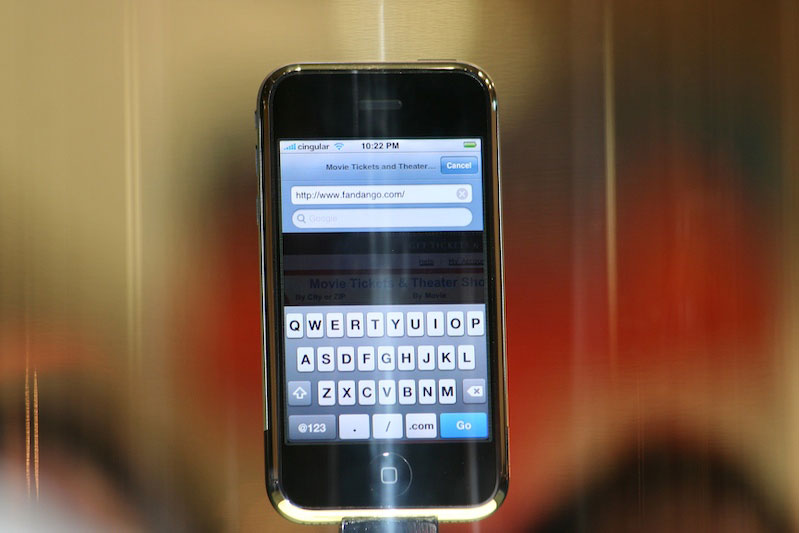Though confident in Apple's iPhone strategy, financial experts at American Technology Research issued a report Monday that highlights some of the more prominent concerns facing early testers of the the multi-functional handset ahead of its release.
Virtual Keyboard
For starters, Wu said he's picking up on some concern from beta testers and supply chain sources that the device's "virtual keyboard" technology may present early challenges for some users.
"On the positive side, using this design allows Apple to maximize its 3.5-inch screen and to limit clutter," he wrote. "However, customers who are accustomed to a physical keyboard may find typing on a screen to be less certain and accurate than on physical buttons and face a learning curve."
Still, the analyst said he's not overly concerned as he believes users will likely spend the majority of their time on navigation-type tasks, such as scrolling through menus and surfing the web. "We believe one overlooked advantage Apple may have over other smart phones is that when making calls, its virtual dialer has no extra clutter, and it is likely easier to dial unprogrammed phone numbers than on fixed QWERTY keyboards," he explained.
Battery Life
Another concern for early iPhone testers, Wu said, is battery life. Apple says iPhone will deliver up to eight hours of talk time (6 hours of Internet use, 7 hours of video playback or 24 hours of audio playback.) The company also claims the iPhone will feature up to 250 hours-more than 10 days-of standby time.
"We hope those times are accurate, but some of our sources have indicated iPhone's active use battery life may be closer to around 4-5 hours for heavy use, similar to other smart phones," the analyst told clients. "However, because an iPhone also serves as an iPod, unless Apple's claims on performance specs are accurate, 4-5 hours of video playback may not be enough for usage such as on international flights, and for phone use afterwards."
Wu said he'd like to see Apple move to a replaceable battery design at some point, similar to its MacBook and MacBook Pro product lines. "We believe this gives customers more flexibility and could even create a lucrative, aftermarket battery marketplace for Apple with its licensing partners," he wrote.
Corporate e-mail works
On a more refreshing note, the American Technology Analyst cited sources who say that iPhone is indeed compatible with corporate e-mail systems based on Microsoft Exchange. However, it will not be as robust as push technology offered by Research In Motion's BlackBerry.
"We believe this may deter usage among some corporate users; however, for consumer users, it is not likely an issue as iPhone works well with popular consumer e-mail systems from Yahoo! and Google," he told clients.
On the other hand, the analyst said, the iPhone's Safari web browser may offer an advantage over other smart phones. "Accessing corporate e-mail through 'Outlook Web Access' from Microsoft could prove to be a usable solution and eliminate the task of synching (web outlook has native access to Exchange and Outlook)," he wrote.
Wu, who maintains a buy rating on shares of Apple, reiterated his $145 price target on the Cupertino-based company, citing potential for additional upside to that target in the coming months.
 Katie Marsal
Katie Marsal







-m.jpg)






 Christine McKee
Christine McKee
 Charles Martin
Charles Martin
 Mike Wuerthele
Mike Wuerthele
 Marko Zivkovic
Marko Zivkovic
 Malcolm Owen
Malcolm Owen


 William Gallagher
William Gallagher

-m.jpg)






61 Comments
""However, because an iPhone also serves as an iPod, unless Apple's claims on performance specs are accurate, 4-5 hours of video playback may not be enough for usage such as on international flights, and for phone use afterwards."
[ View this article at AppleInsider.com ]
I'm fairly confident that Apple will release a Magsafe airline charger for iPhone.
I'm fairly confident that Apple will release a Magsafe airline charger for iPhone.
I'd be even more confident that since iPhone has a 30-pin iPod connector, the airline adapter won't be mag safe.
Yep, tons of ipod chargers out there that will work fine.
The improved battery life and glass screen are helping the stock jump today.
As for email, I think Safari is a great way for corporate users to access their Exchange accounts. An easily created app that can be built to look like the iPhone's UI while providing all the necessary Exchange info and interacting with the core iPhone components.
I'm fairly confident that Apple will release a Magsafe airline charger for iPhone.
How exactly is that going to work with the 30-pin connector?
he's picking up on some concern from beta testers
sure, the beta test program for the iPhone, who hasn't heard of it?
what a blowhard, I'm sure he is at least 6 degrees removed from anyone who has ever even seen an iPhone, let alone any 'concerned beta testers'. don't make me laugh.